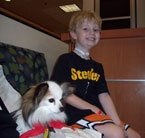
Hopkins Children's patient Alex McShane was among the first to undergo nerve repair surgery for transverse myelitis.
Six-year-old Alex McShane and his parents know all too well the devastating effects of the neurological disorder transverse myelitis (TM). Diagnosed in September 2009 with TM, which damages nerves in the spinal cord and disrupts their communication throughout the body, Alex suffered within the span of a week symptoms ranging from severe neck pain to difficulty breathing to complete loss of function of his right arm. Steroid treatments at a hospital near the family’s suburban Philadelphia home helped halt the inflammatory process of the disease and allowed the natural recovery of his neck and respiratory muscles, but any regeneration of nerves in his right arm has been, in his mother’s words, “zero.” She also knew that only one-third of TM patients fully recover such function, and that patients with a rapid onset of symptoms like Alex generally do poorer. She was deeply worried about the permanent loss of muscles in his right arm.
“Specialists who have seen this presentation of transverse myelitis say that the brachial plexus injury tends not to come back,” Angela McShane says.
To make matters worse, there’s no cure for TM, no surgery that can fix it. At least that’s what she had read. But then she learned that neurosurgeon Allan Belzberg had performed a novel nerve-repairing surgery on two other pediatric patients with transverse myelitis at Hopkins Children's. It would be a long and technically challenging procedure with some risks – including further nerve damage – and no guarantees of success, but Angela McShane suddenly saw hope.
“Looking at the long-term benefits we felt we needed to give him the opportunity to get that right arm back,” McShane says. “The surgery seemed like a perfect fit because it’s repairing damaged nerves, which is what transverse myelitis really is.”
How does the operation work? Belzberg explains that in the six-hour surgery, which Alex underwent on March 23, he rewired the still-active spinal accessory nerve that controls the trapezius muscle and the scapula, or shoulder blade, to musculocutaneous nerve that flexes the elbow, which in Alex were dormant. That would restore motor function of the elbow critical for use of the arm. But connecting these nerves required a nerve graft to lengthen and splice them together, which Belzberg harvested from Alex’s left leg.
“Basically I’m robbing from Peter to pay Paul, taking part of a nerve that’s still working and moving it and its function into an area that’s not working,” says Belzberg, who specializes in surgical repair of nerve injuries from trauma and tumors. “Many of us have been repairing nerves like this for years, but the idea that you’re going to apply it to a problem like transverse myelitis is novel.”
But not without some costs, though minor, Belzberg notes. Alex will lose some function from this nerve rewiring, like the ability to shrug his shoulder, and some loss of sensation in his left foot. Also, he’ll have to learn that nerves he once prompted to perform certain muscle movements now produce new movements.
We’re transferring function,” Belzberg notes, “so when he thinks ‘shrug my shoulder,’ his arm is going to bend. But overtime he and his nervous system will adapt.”
The surgery went very well, Belzberg says, but its effects won’t be seen for at least six months as nerve regeneration is a protracted process of approximately 1 inch of nerve regeneration per month. Also, even if Alex achieves the best possible nerve regeneration from the operation, he will still not recover 100 percent of his right arm.
“It won’t be normal but he will have fairly smooth bending of his elbow that will help him have a useful arm, a good helper arm for his good left arm,” Belzberg says. “The alternative, no movement, is obviously not very good.”
Confident she made the right decision in moving forward with the surgery, Angela McShane says, “We call Alex ‘Spicey’ because he’s so active and there’s a bit of spice in his personality. He’s had a rough road but we’re seeing that personality coming back."
##
